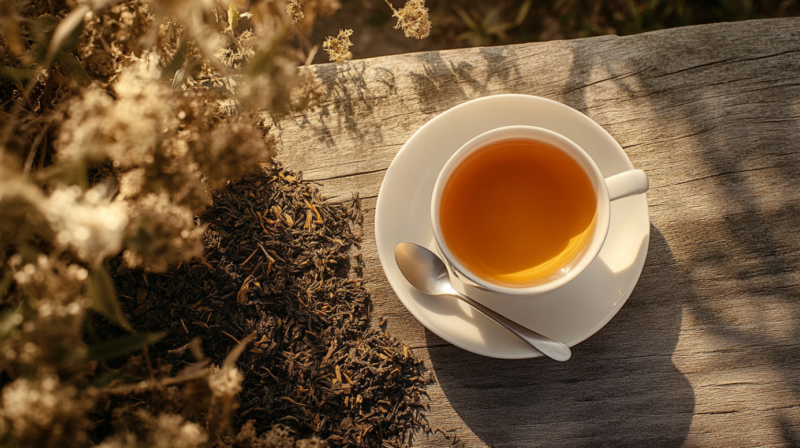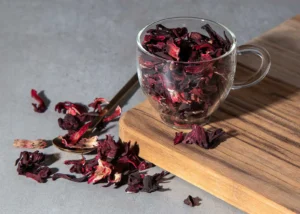Let’s be honest—keeping your immune system running smoothly feels like maintaining your car: skip the tune-ups, and eventually, you’ll stall out.
But sipping the right tea regularly can turn your immunity into a finely tuned engine.
After plenty of cups brewed (and plenty of colds avoided), I’ve found a clear winner: green tea tops the list for immune health thanks to its powerful antioxidants and inflammation-fighting qualities.
But green tea isn’t riding solo—ginger, elderberry, turmeric, and others also pack a serious punch.
Key Takeaways
1. Green Tea: Antioxidant Powerhouse

Green tea is the classic workhorse of immune-boosting teas. It owes its benefits primarily to its impressive antioxidant content—especially the powerful compound known as epigallocatechin gallate (EGCG).
A 2021 study in the NCBI confirmed that EGCG significantly reduces oxidative stress and inflammatory responses—two major factors linked to compromised immune function.
Regular intake of green tea has been shown to reduce the risk and severity of upper respiratory infections and may even accelerate recovery time from illnesses.
How to Brew
2. Ginger Tea: Natural Anti-inflammatory
View this post on Instagram
If green tea is the reliable family sedan of tea, ginger tea is the cozy heated seat—warming, comforting, and soothing to the body and soul.
Ginger’s potent compound, gingerol, is the real star, delivering profound anti-inflammatory and antiviral effects.
Research from PubMed reveals ginger has impressive antiviral qualities, combating respiratory infections and reducing throat inflammation effectively.
Regular ginger tea consumption relieves congestion, reduces symptoms of nausea, and gently aids digestion, making illness recovery quicker and more comfortable.
How to Brew
- Slice about one inch of fresh ginger root.
- Simmer in boiling water for around 10 minutes.
- Add a squeeze of fresh lemon and a spoonful of honey to enhance flavor and vitamin C content.
3. Elderberry Tea: Immune System Booster
Think of elderberry tea as your body’s roadside assistance during flu season.
Elderberries, naturally rich in immune-enhancing antioxidants called anthocyanins, give your immune system a powerful jump-start.
According to a controlled trial published in the Research Gate, elderberry extract notably shortened flu symptoms duration by approximately 3–4 days.
Elderberry tea supports increased production and activity of immune cells, enhancing your body’s overall resistance to pathogens.
How to Brew
- Steep 1–2 teaspoons of dried elderberries in boiling water for 10–15 minutes.
- Add cinnamon or cloves for extra antiviral punch and delicious flavor complexity.
4. Peppermint Tea: Antimicrobial Support
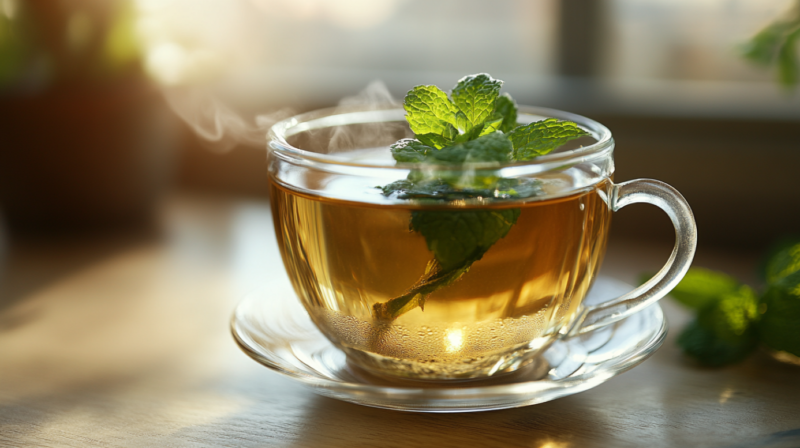
Peppermint tea is your immune system’s refreshing cool breeze.
The menthol found in peppermint leaves offers significant antimicrobial and antiviral support, effectively fighting pathogens and soothing irritated respiratory passages.
Research published in the Asian Pacific Journal of Tropical Biomedicine confirms peppermint’s effectiveness against certain harmful bacteria and viruses, making it beneficial for respiratory health.
Peppermint tea reduces nasal congestion, eases sore throats, and soothes digestive discomfort associated with illness.
As a bonus, peppermint calms headaches and aids digestion, making it a versatile tea beyond immune support.
How to Brew
- Steep 1–2 teaspoons dried peppermint leaves in freshly boiled water for 5–7 minutes.
- Breathe in the aromatic steam deeply for immediate respiratory relief.
5. Chamomile Tea: Stress-Reducing Immune Support
@freshgirlfusions Feeling overwhelmed or experiencing pain? When my stomach’s acting up or my mind won’t quiet down, I turn to #chamomiletea . This ancient herb offers soothing relief in so many ways, and helps calm inflammation. A little cup of comfort goes a long way! 🫖🌼 Benefits of #Chamomile: #GlowingSkin: Reduces inflammation and soothes skin irritations for a radiant complexion. #GutHealth: Calms upset stomachs and aids digestion, promoting a happier gut. #PainRelief: Acts as a natural anti-inflammatory, easing sore muscles and headaches. #MentalClarity: Eases anxiety and enhances focus when stress hits. #ImmuneBoost: Strengthens your immune system, helping you fend off illness. #SleepAid: Promotes better sleep and helps with insomnia. #Menstrual Relief: Eases menstrual cramps and discomfort. #HeartHealth: May help lower blood pressure and improve circulation. #BloodSugarControl: Can assist in regulating blood sugar levels. #AllergyRelief: Reduces symptoms of allergies due to its anti-inflammatory properties. #StressReduction: Helps lower cortisol levels for a greater sense of calm. ✨🙌🌼 *Disclaimer: I’m not a doctor; any information shared is based solely on my personal experience and knowledge. If you have any health concerns or are taking medication, consult a healthcare professional before using chamomile, especially if you are pregnant, nursing, or allergic to plants in the daisy family. #herbal #herbaltea #herbtok #healingtiktok #medicinalplants #medicinalherbs #healingherbs #calming #antiinflammatory #antistress #digestivehealth #periodtips #immunity #glowingskin #freshgirlfusions ♬ 温暖的钢琴背景 Warm Piano Background – LuLu_Production
Chamomile tea functions like your immune system’s stress-relief valve.
Chronic stress compromises immune function; chamomile actively combats stress and anxiety through flavonoids like apigenin.
According to a study published by John R Keefe, chamomile reduces cortisol (stress hormone) levels, indirectly strengthening immune responses and resilience.
The anti-inflammatory properties of chamomile tea relieve congestion and soothe irritated throats during colds and flu.
How to Brew
- Steep 2 teaspoons of dried chamomile flowers in boiling water for 5–10 minutes.
- Drink daily, especially in the evening, to maximize relaxation and immune benefits.
6. Turmeric Tea: Potent Anti-inflammatory
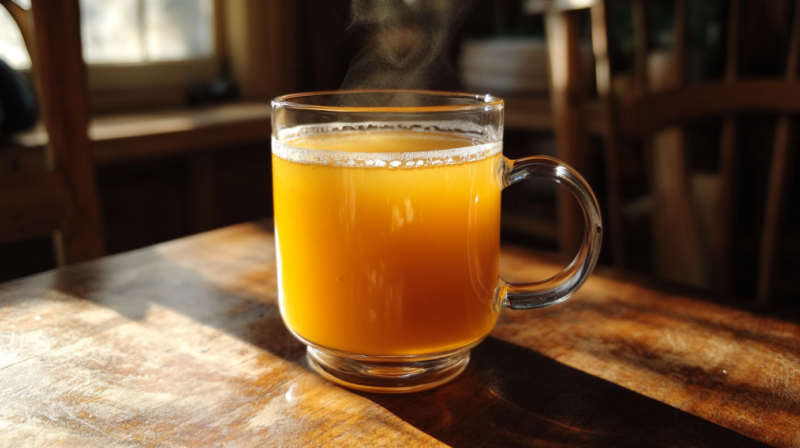
Turmeric tea is the most powerful muscle car in the tea world, thanks to curcumin, its highly potent anti-inflammatory and antioxidant compound.
Some studies also suggest curcumin notably improves immune responses and lowers chronic inflammation levels.
Turmeric tea is beneficial in preventing illness and managing symptoms by modulating inflammatory reactions.
How to Brew
- Dissolve 1 teaspoon of turmeric powder in hot water or milk.
- Add black pepper (enhances curcumin absorption) and honey or maple syrup to taste.
7. Echinacea Tea: Proven Cold Fighter
Can echinacea melt winter’s colds and #flu? https://t.co/TcUMUp0c8W via @WSJ
— Mayo Clinic (@MayoClinic) January 16, 2016
Consider echinacea tea your body’s seasoned mechanic—always ready to boost immune defenses. Its active compounds increase white blood cell production and enhance immunity.
A respected study published in The Lancet Infectious Diseases reported echinacea significantly reduces cold occurrence and shortens their duration when consumed regularly.
Ideal for seasonal immune strengthening and minimizing downtime during flu season.
How to Brew
- Steep echinacea tea bags or dried leaves for 10–15 minutes.
- Drink regularly during peak illness seasons for consistent immune support.
8. Lemon Balm Tea: Stress Management and Immunity
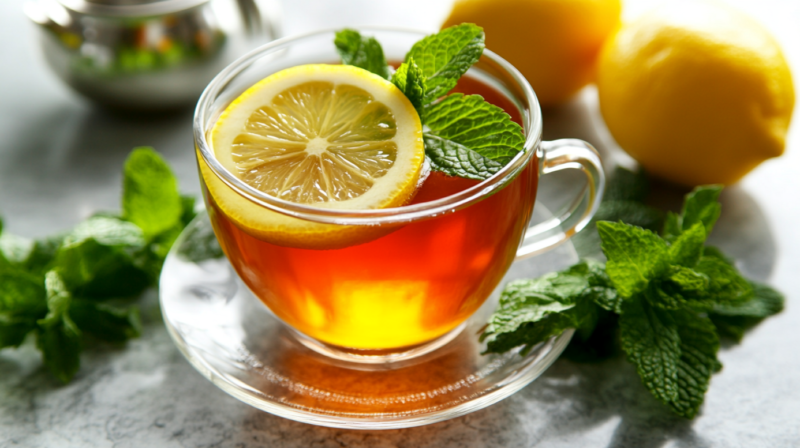
Lemon balm tea acts like your body’s calming playlist—reducing stress hormones that compromise immune function.
A clinical study in the journal Nutrients highlighted lemon balm’s effectiveness in reducing stress and anxiety, positively impacting immunity.
How to Brew
- Steep 1–2 teaspoons dried lemon balm for 5–10 minutes.
- Enjoy during stressful periods or before bedtime for maximum benefit.
9. Hibiscus Tea: Vitamin C Supercharge
Hibiscus tea is like a turbocharged boost for your immune system—vibrant, refreshing, and packed with antioxidants, especially Vitamin C.
You might already know Vitamin C as a classic immune ally, but hibiscus brings more to your cup than simple vitamins.
It’s naturally rich in antioxidants that help neutralize harmful free radicals—basically preventing “rust” in your cells, keeping your immune defenses sharp and ready to respond quickly to threats.
Drinking hibiscus tea regularly can help strengthen your body’s defenses against colds, flu, and other seasonal bugs.
Plus, it has anti-inflammatory properties that gently soothe and support your immune system, keeping your whole body feeling its best.
How to Brew
- Steep dried hibiscus flowers in hot water for 5–10 minutes.
- Serve iced or hot—refreshing and beneficial either way.
10. Rooibos Tea: Caffeine-Free Antioxidant Boost
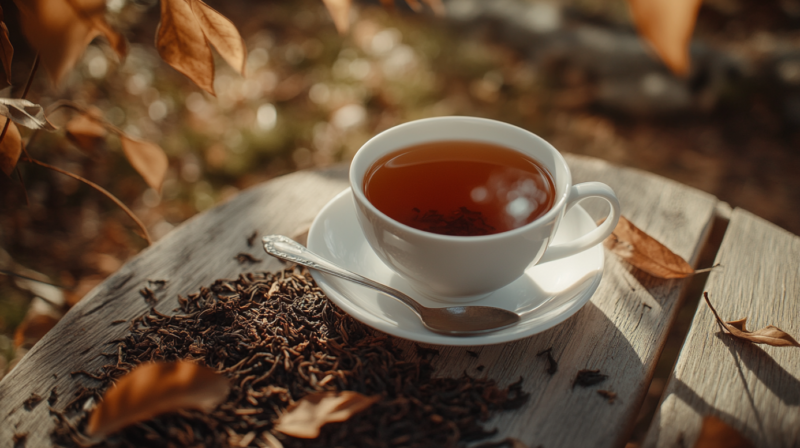
Rooibos tea is your immune system’s gentle but powerful ally.
Think of it as the soothing evening drive after a busy day—steady, calming, and supportive. Unlike other teas, rooibos is naturally caffeine-free, so you can drink it at any time of day or night without worrying about sleep disturbances.
Rich in antioxidants, especially quercetin, rooibos helps your body reduce inflammation and oxidative stress—two significant factors that can compromise immune health over time.
Regular consumption gently strengthens your immune response, improving your body’s ability to withstand everyday challenges like seasonal allergies, common colds, and fatigue.
How to Brew
- Steep rooibos tea bags or loose-leaf for 7–10 minutes.
- Add honey, almond milk, or vanilla for extra enjoyment.

